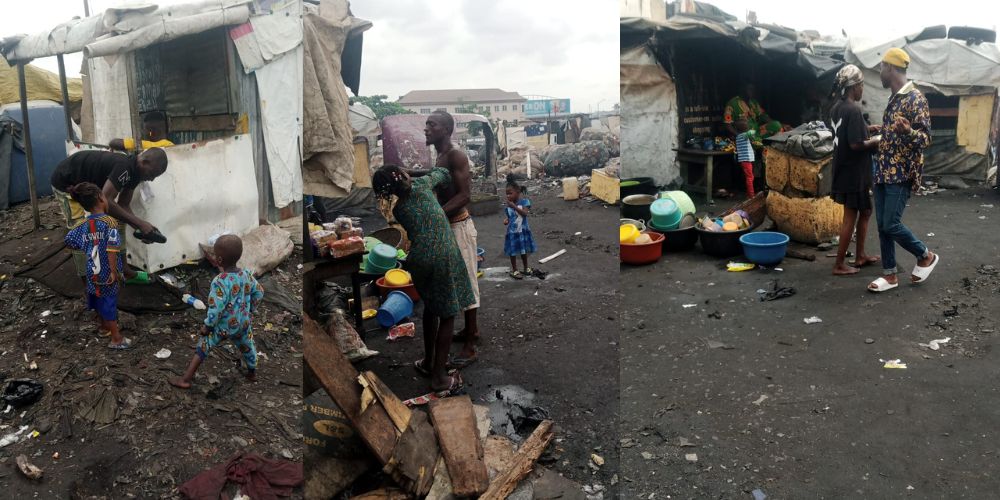Trapped In Trash! The Dire Living Conditions Of Scavengers In Lagos
Going to Iyana Ipaja from Ijaiye in Lagos State, one thing is conspicuous on the right side of the Lagos-Abeokuta Expressway: a huge refuse site between the Super bus-stop and Ilepo Market. Located on 21 hectares of land, Abule Egba dumpsite is said to be the second oldest site. It was opened in 1982.
With dirt littered everywhere and offensive smell oozing out from all corners of the site, undaunted scavengers are seen toiling day in and day out to make a living gathering waste.
Advertisement
These scavengers who built makeshift houses with tarpaulin, have made the site their home. With no money, education and skill, they see scavenging as the only alternative to survival.
While scavengers play a critical role in the whole value chain of the circular economy, the level of health risks those at Abule-Egba dumpsite are exposed to should be a source of worry to the Lagos State government.
Landfill sites are known for emitting poisonous gases such as hydrogen sulphide. These gases can have negative effects on one’s respiratory organs and cause lung cancer. Scavengers at Abule-Egba dumpsite not only cook and eat food there, but they are also raising children there. THE WHISTLER correspondent visited the site and saw children between two and seven years old being taken care of by their parents. Children are vulnerable and living in that kind of environment puts their health at risk.
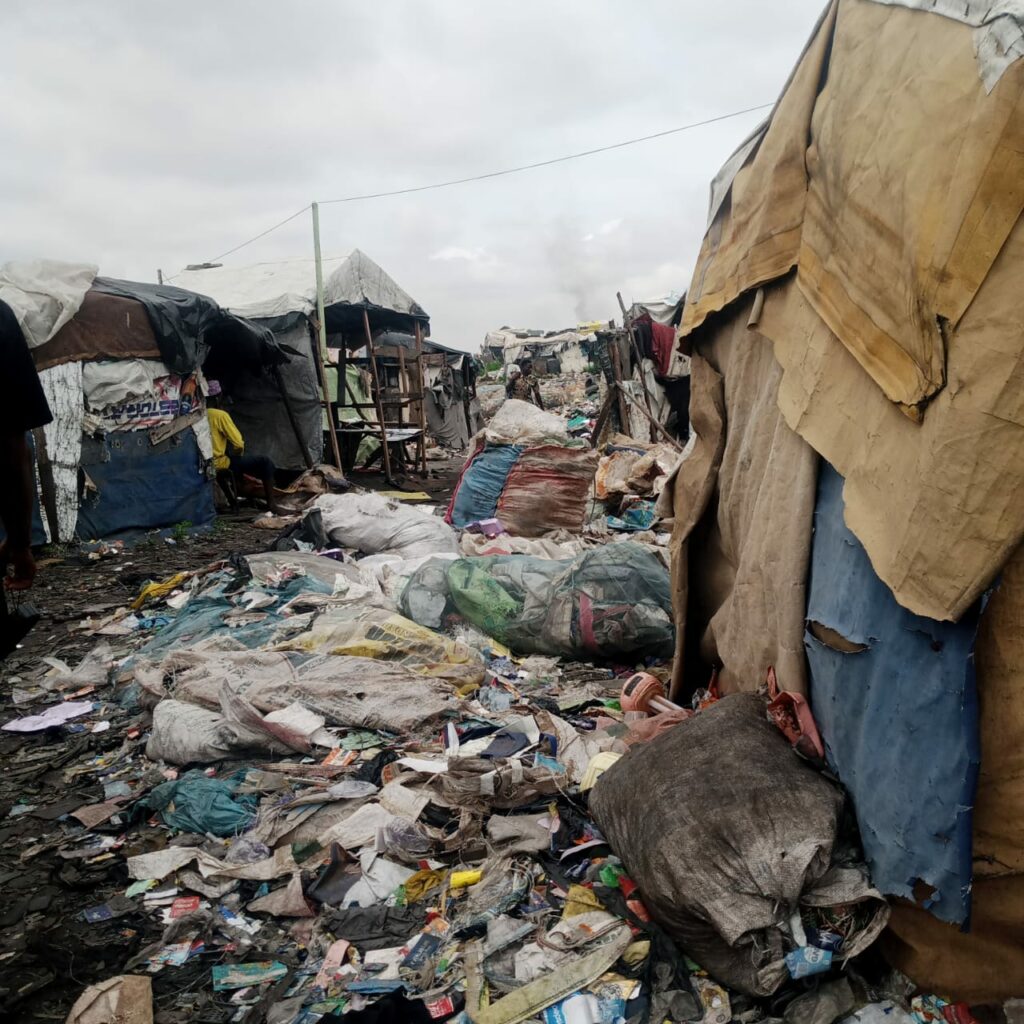
Advertisement
Desire To Quit
Tired of their misery, some of them said they would be glad to get a loan or grant from the government to quit scavenging.
Bola Fatai has been living and working at the site for more than three years. Separated from her husband, she has four children.
A slim, skinny and dark lady in her forties, Fatai looks older than her age. With just N15,000 in income in a month, she is obviously overwhelmed with responsibilities.
“I’ve been working here for three years. I was previously married but now separated.
Advertisement
“I’ve four children, and it’s from this thing that I take care of them,” Fatai told THE WHISTLER.
“I’ll like to own a provision store, but I don’t have the money to start the business. I’ll like the government to help me financially.
“I make like N15,000 monthly. It’s from the money that I provide for myself and family,” she said.
Just like Fatai, Halimat Jabir has been scavenging at the site for about ten years. The mother of five who said her monthly income is about N30,000, lamented that it is challenging having to feed her children and provide other necessary things for them from the income.
Jabir has a passion for business but does not have the money to start one. She wants the government to help her with a loan or grant so that she can start up something and leave scavenging.
“It’s been like ten years since I started this (scavenging). I have five children,” Jabir said.
Advertisement
“I like business, but it’s money that has been stopping me from setting up a shop.
“If I get financial support from the government in terms of a loan or grant, I’ll leave this place.”
Another scavenger, Muhammed Kabiru, said he was formerly in the Nigerian Army before he had issues and left the army in 1972. Thereafter, he moved to Lagos and ventured into scavenging.
The Zamafara-born indigene has two wives with nine children – all of them living at the stinking site.
Kabiru wants to go into recycling of waste and wants financial support from the state government.
“I’ve been doing this for more than thirty years,” he said. “I’m a family man. I’ve nine children here.
“I’ve two wives and they’re Yorubas, Abeokuta in Ogun State to be precise,” Kabiru said smiling.
“Let the government help us with money, I don’t mind a loan,” he stated.
For Abdul-Hakeem, he became a scavenger because he did not want to beg or steal. He believes in the dignity of labour but acknowledges that being a scavenger is challenging.
“I’m not enjoying this, but there’s no other thing I can do,” Abdul-Hakeem lamented.
“I’m into scavenging because I don’t want to beg or steal. I’m just here managing myself. If I should get another job, I’ll leave this.”
Explaining the volatility in the scavenging business, Abdul-Hakeem said: “I sometimes make up to N50,000 in a month, some other months, I make less than that.
“I’ll like the government to support me with a loan or grant. I’ll like to be independent in this business, and be partnering with big companies on plastic recycling.”
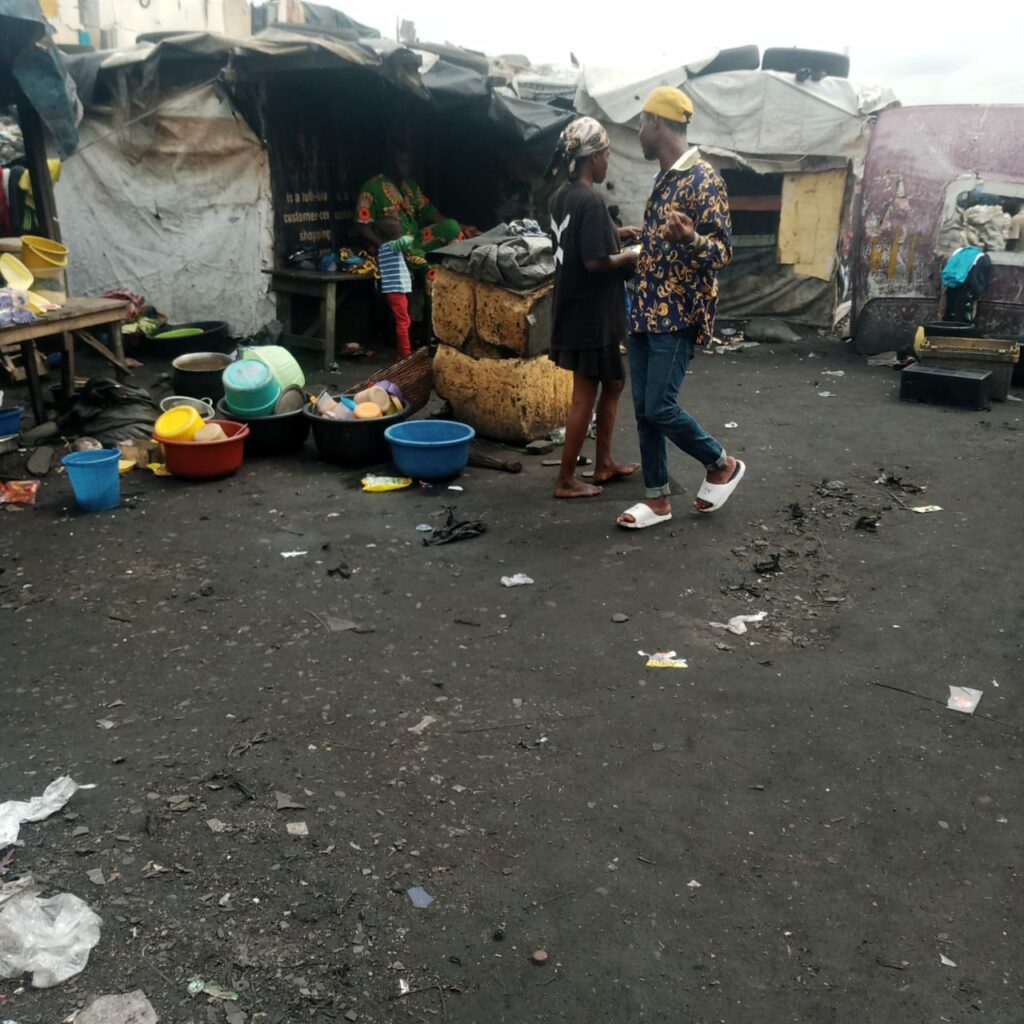
A food seller at the site, Grace Johnson, also told THE WHISTLER she would like to own a restaurant outside of the pungent dumpsite but complained that she does not have the financial resources to set up such a business for now.
Johnson, in addition to her food business, scavenges at the site. She said that she needed financial help from the state to set up the restaurant.
Johnson who should be in her late sixties has four children. According to her, while her children are grown-ups, she still has grandchildren she is taking care of.
“I need the state government’s financial support to start a restaurant outside of here,” he said.
Unlike his colleagues, another scavenger, Lukman has become addicted to scavenging. He told THE WHISTLER that even if he gets a job, he would still combine it with scavenging.
Lukman who said he is not married is in his late forties.
“If I see another job that will pay me better than this one, I’ll go for it, but will combine the job with scavenging,” he said beaming with smile.
“I’ve been in this business for about thirty years, and I’m kind of addicted to it,” he said. “This is where I live. That’s my house,” he said, pointing at a makeshift house built with tarpaulin.
These scavengers do not have only money to worry about, they also have their health to worry about. Scavengers are exposed to physical injuries, pathogenic organisms, and harmful substances. More worrisome is that most of the scavengers at the site, our correspondent observed, had no Personal Protective Equipment (hand gloves, facemasks and booths) while working at the dumpsite – making them even more vulnerable to health risks.
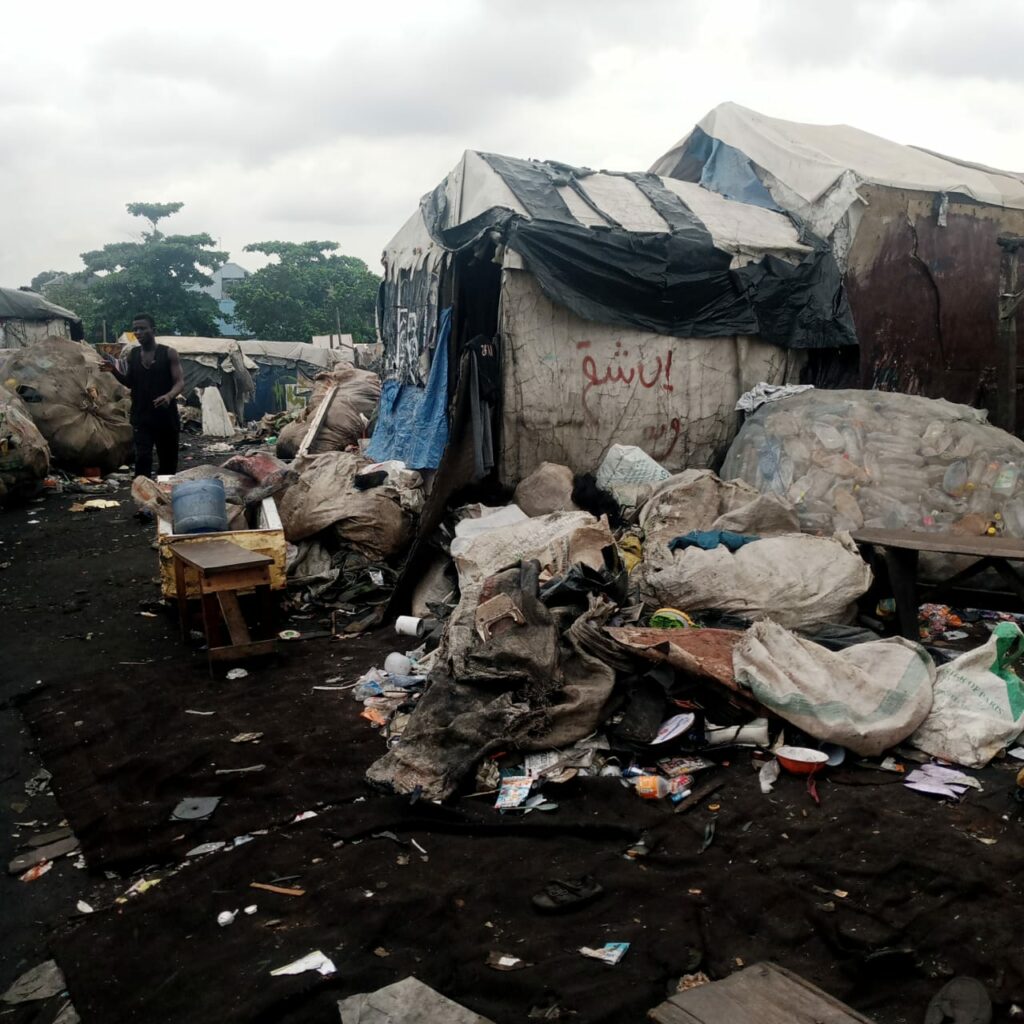
Lagos Government Reacts
The Lagos Waste Management Authority (LAWMA) is the agency responsible for the collection of waste, transfer, treatment and disposal, as well as cost recovery for services in the state.
Part of LAWMA’s vision is to provide professional services to the government, particularly in the area of landfill management.
To find out what LAWMA is doing to ensure that scavengers are not allowed to live at the site, considering the health risks they are exposed to, and also if the agency holds sensitization programmes to educate scavengers at the site on the importance of wearing boots, facemasks, and hand gloves for their safety, THE WHISTLER contacted the Director, Public Affairs of LAWMA, Folashade Kadiri.
According to Kadiri, the dumpsite closes by 6 p.m. This, she said, is to ensure that the dumpsite is not used as a living home and also reduce the health risks associated with long exposure to waste materials.
“One of the key steps LAWMA has taken is the establishment of clear operational hours for the dump site. By closing the dumpsite at 6 p.m., LAWMA aims to discourage overnight stays and promote a safer environment. This restriction aligns with LAWMA’s commitment to ensuring that the dumpsite is not used as a residential area, thus reducing health risks associated with prolonged exposure to waste materials,” she said.
The LAWMA spokesperson informed that through its sensitization campaigns, LAWMA is working to formalise the involvement of scavengers in the state’s waste management ecosystem.
“LAWMA recognises the importance of integrating the informal sector into the waste management ecosystem while ensuring their safety and well-being. Through ongoing advocacy and enlightenment campaigns, LAWMA is actively working to formalise the involvement of scavengers. This formalisation process aims to regulate their activities, properly profile them, and provide them with the necessary personal protective equipment (PPE). By doing so, LAWMA is not only enhancing the safety of these workers but also integrating them more seamlessly into the existing recycling value chain,” Kadiri stated.
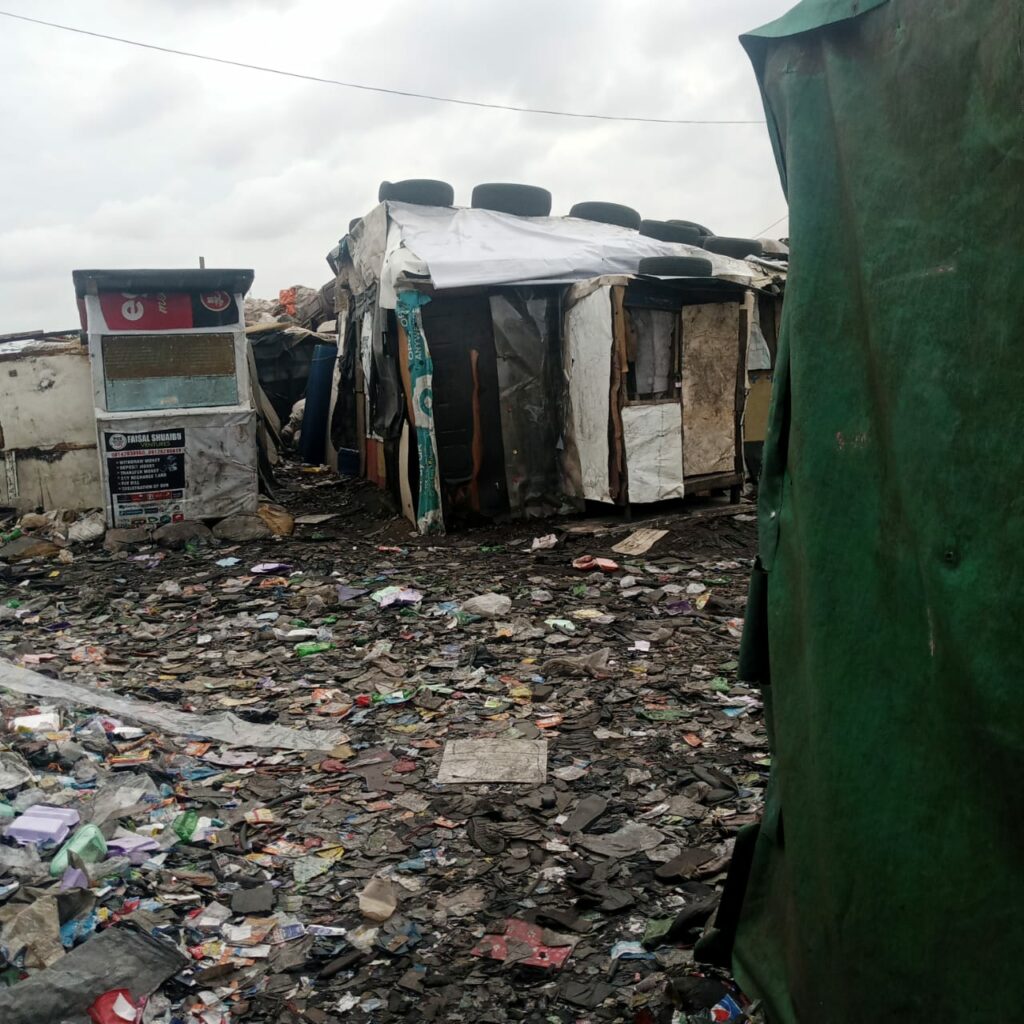
Society Should Be Worried – Experts
Speaking with THE WHISTLER, The Chief Executive Officer of EpidAlert, Dr Lawal Bakare, said society should be worried when people are seen living less than human life just to survive.
Bakare noted that those who live in places such as a dumpsite are easy targets for social vices, and can be a problem to society.
According to him, eating and living in a dumpsite exposes one to lots of health risks. He explained that they are exposed to chemicals, and sharp objects, which aside from cuts, also expose them to infection.
According to Bakare, they are also exposed to infectious agents like HIV and hepatitis, which are blood-borne, especially when waste management authority does not cater properly for medical waste. This, he said, is in addition to fungi and respiratory infections.
“People don’t get adapted to what’s wrong, that’s not the right kind of adaptation,” he said. “When people who’re down are adapting to a subhuman lifestyle, society should be worried, because those are the people that are an easy target for social vices, an easy target for destruction of society.”
“It’s just neglect. Ideally, society shouldn’t allow people to expose themselves to harm, even if they want to,” Bakare said.
He called for a protective waste management policy, stressing that waste management authority should make dumpsites a professional environment.
“The concept of waste management itself is so that you can remove these injurious or harmful agents from living to the place where they can be properly handled and made safer for either recycling or converted into biological recycling for compost and all of that,” Bakare said.
“On the other hand, it’s the true economic conversation, where you’ll say: if you chase those people that are handling waste away from where they’re handling it, what becomes of them? Are you providing them alternative solutions for services over the period they’re no more in those services?,” he said.
“On the ideal society, we shouldn’t allow children to work. The people who handle waste, probably want to make sure it’s a professional environment. Waste recycling is a business. So if a company wants to use people in the lower extreme of the value chain, the government should kind of push for a bit of refinement, as opposed to just having absolute neglect of what’s happening in that market.
“It’s an unfortunate story that we kind of have a way of not bringing those who might benefit from this support into our reform,” Bakare regretted.
Also speaking with THE WHISTLER, a public health expert and Executive Secretary of Health Reform Foundation, Dr Celestine Okorie, said the scavengers can be exposed to diarrhoea, cholera and other communicable diseases. This is aside from getting injured by sharp objects and contracting an infection from there.
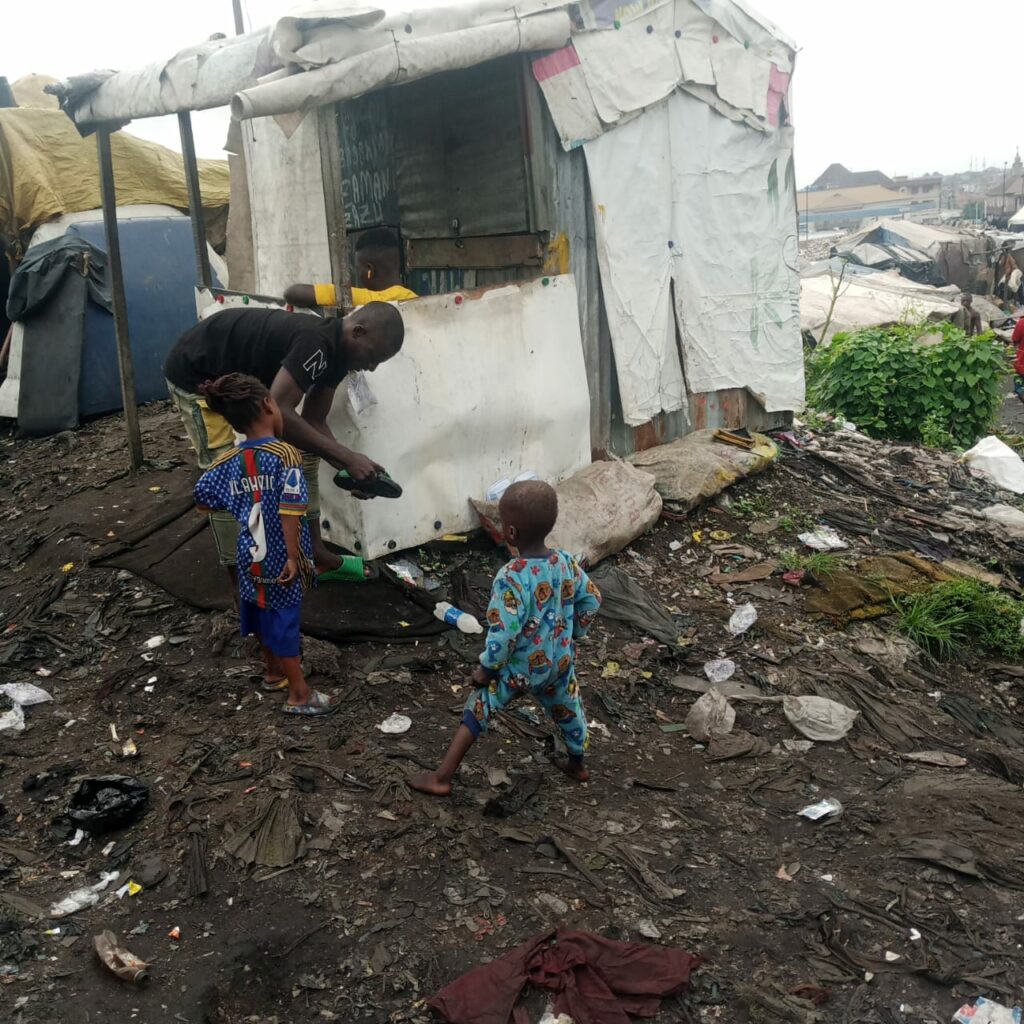
“These scavengers use their bare hands to scavenge for all kinds of things in a very unhygienic environment. In the first instance, they’re very highly exposed to communicable diseases, because they use their bare hands most of the time,” Okorie explained.
He advocated for proper regulations of dumpsites and enforcement of same by the government, adding that scavengers should be made to wear PPEs.
“They (government) should put appropriate regulations in place and prevent people from going to the dumpsite, scavenging with their bare hands and all that. Even if people want to scavenge, they must wear some Personal Protective Equipment,” he said.
“It’s about regulation and enforcing the regulation – making sure that it’s not a free for all affairs like it’s here in this part of the world.”
While acknowledging the harsh economic situation these scavengers are into, with a number of them homeless, Okorie noted that allowing them to live at the dumpsite on compassionate ground has negative implications.
“Scavenging is like a survival strategy. People want to survive, they want to look after themselves and their families,” he said.
“But there could be regulations. The government can regulate it. The waste management agencies can regulate these dumpsites; make sure that people don’t live there, put in some security and make sure that even if people have to scavenge, they wear Personal Protective Equipment (PPE) before they can enter to scavenge.”
Reiterating the need for regulation and policy at dumpsites, Okorie noted: “When they get sick, they become a liability to the society. Every effort must be made to prevent people from scavenging for free. What I mean (is that); it’s not something that should be a means of livelihood for everybody – free for all. There should be a regulation and policy.”


